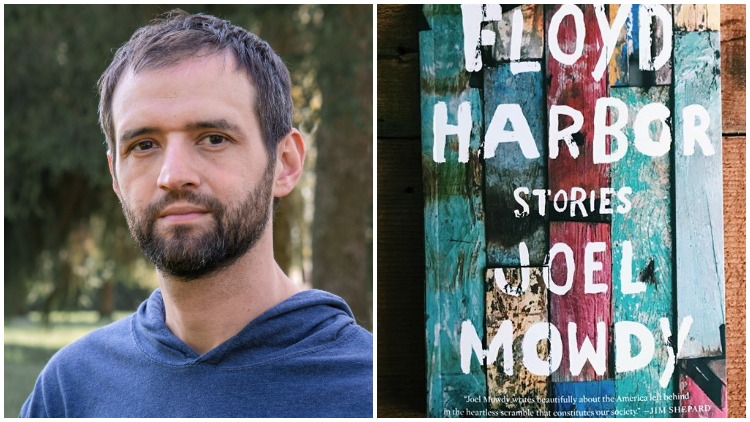Author Joel Mowdy has lived many lives.
He is currently a teacher at Green School in the jungles of Bali, Indonesia where students learn, among other things, how to be environmentally conscious. It’s a career path dreamed up during time spent in his wife Simona’s home country of Lithuania, where he still owns a forest homestead and where his son, Oskar, was born. It came after unsuccessfully seeking employment in Nottingham, England while he and Simona lived off of dwindling savings. The two moved there a few years after meeting one another and falling in love in Southampton, where they both worked in the same restaurant after he graduated from Hofstra University.
Mowdy’s post-grad life seems the stuff of novels, but his new book, Floyd Harbor, out May 14 from Catapult, harkens back to the time before all the journeying began. The collection of 12 short stories, set mostly in the 1990s, reflect his youthful days on the South Shore of Long Island.
The author was born and raised along with 12 brothers and sisters in Mastic Beach. It was a youth spent, “playing in the woods, camping on the Sound, crabbing, and swimming in the Atlantic.”
But the subject matter the book breaches is not that of warm summertime recollection. Its focus lies more in the perpetual struggle of the marginalized Mastic Beach residents Mowdy came to know in his teenage years. People living in broken homes and afflicted by poverty.
“I’d go to friends’ houses and never once see a parent around,” he recalls. “They’d have one parent working, one in jail or just gone, or their single father was working full time, going to weekly drug counseling meetings and taking a taxi to the clinic every day to get their dose of methadone.”
These are the same trying circumstances that arise in the world of Floyd Harbor, and its inhabitants deal with them in myriad ways. Some kick around in dead end jobs, some look for ways to game the system, most dream of a more favorable situation. They find themselves mixed up in drug use, money making schemes, sordid sexual experiences. They yearn for youthful thrills, cool cars, love, recognition.
The stories in Floyd Harbor present a number of weaving interconnections: characters reappear, events reoccur, and perspectives are subsequently altered.
“My plan was simply to write the kinds of stories I wanted to read, and the connections happened organically,” the author says of the book’s correlating narratives, “scene, setting, or character in one story would suggest another story. Two stories would suggest a third.”
When asked how much of the book is autobiographical, Mowdy is reluctant to tip his hand.
“Somewhere between zero and one hundred percent,” he quips, but there is no denying that his fictional world is based primarily in reality.
Characters cruise up and down William Floyd Parkway, Sunrise Highway, and Guy Lombardo Avenue. They shop at King Kullen and Handy Pantry. They dine at New Rooster Kitchen and John’s Pizzeria, both still standing on Neighborhood Road in his hometown.
Some of the experiences within are primarily his own, too. Much like many of the characters in the book, he once “took on whatever soul-sucking job” he could in order to make ends meet. He too felt the tightening grip of the post-high school hometown trap and dodged recruitment commercials like Will in “Salty’s.” He experienced firsthand the heart-wrenching effects of his Vietnam veteran father’s PTSD just like Sal in “The Shaft.”
The big difference between Mowdy and many of the people who inhabit the Mastic Beach portrayed in Floyd Harbor is that he eventually left. His experiences as an educator in Bali and on his forest homestead in Lithuania will be what informs his writing going forward, but his first book will stand as a tribute to that former life on faraway Long Island. Twelve true-to-life stories stemming from a revelation brought to him by his first English professor at Suffolk County Community College.
He learned that he didn’t have to write about, “a certain class of people who held enviable jobs, went to weekly therapy sessions, and had epiphanies in exotic locales.”
“Not that these were bad stories,” he says. “They were just not my stories. My characters too could suffer from broken hearts, disappointments, self-doubt, loss, trauma, and embarrassment, but with the additional pressures of rent or tuition due, unemployment, no phone service, an empty fridge, fractured family, addiction, and a lack of transportation,” he realized, “I could write about Mastic Beach.”
Floyd Harbor is out May 14 on Catapult. Joel will be doing signings at McNally Jackson Books on 52 Prince Street in Manhattan at 7 p.m. May 15 and at Brickhouse Brewery on 67 West Main Street in Patchogue on May 17.































